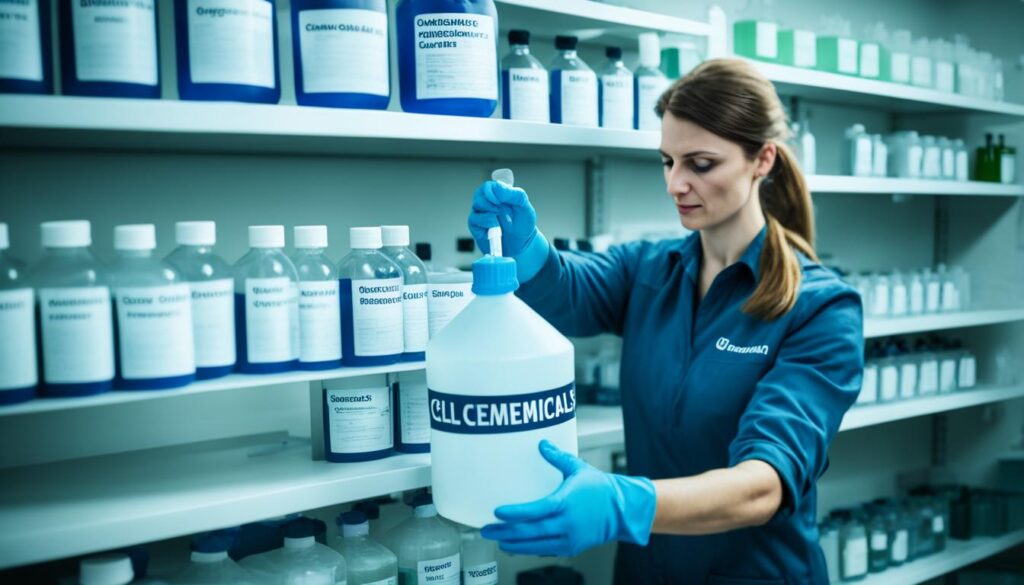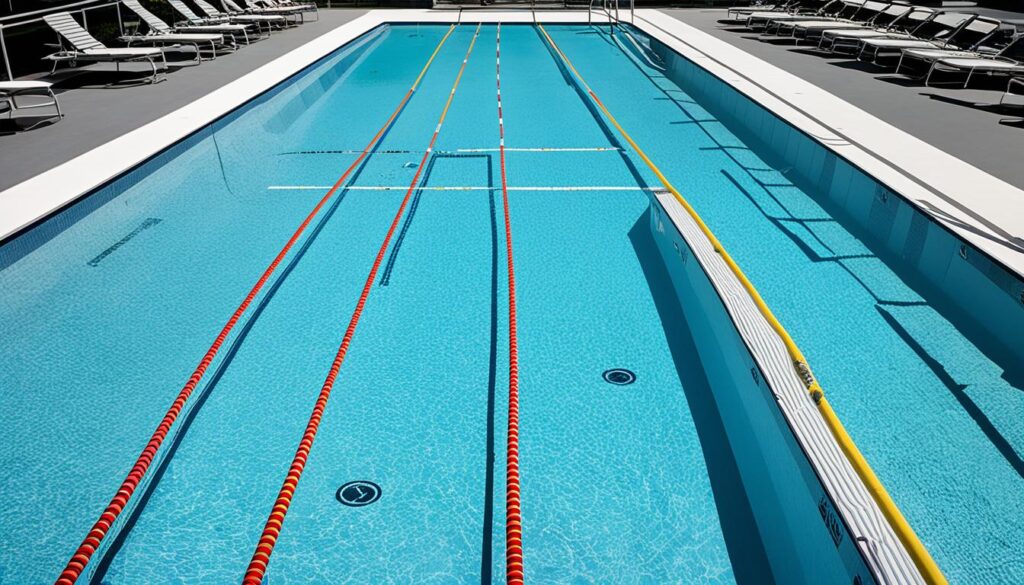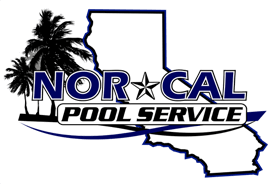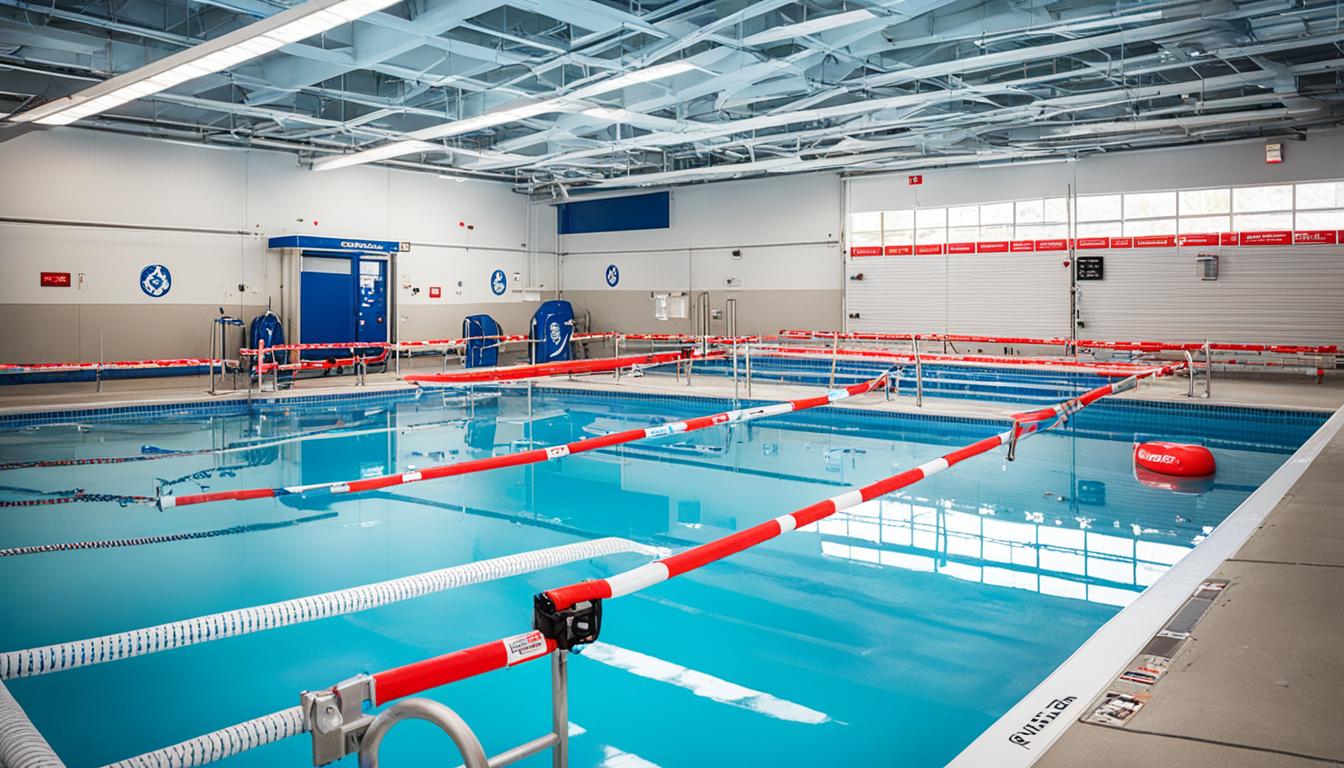Commercial pool codes and public pool compliance are key to pool safety. In Florida, these rules are in Chapter 64E-9, covering 14 sections on public swimming pools1. We’ll explore the main legal requirements to keep your commercial pool safe and up to code.
Pool safety covers many areas, like structure and emergency gear. Florida requires certain safety equipment, like a 16-foot rescue pole and an 18-inch life ring buoy2. These rules help make pools safe for everyone.
Commercial pool codes also focus on water quality and handling chemicals. The ideal pH level for pools is between 7.2 and 7.8 to kill bacteria safely3. Following these standards keeps the swimming area healthy.
Public pools must also meet design and construction standards. You must get your pool plans approved before building3. This ensures your pool is safe and accessible, following the Americans with Disabilities Act of 19901.
Key Takeaways
- Florida’s Chapter 64E-9 outlines 14 sections of public pool regulations
- Specific safety equipment is required for commercial pools
- Water quality and chemical balance are crucial for pool safety
- Construction plans must be approved before building a commercial pool
- Compliance with ADA standards is necessary for public pools
Understanding Commercial Pool Regulations
Commercial pools are key in our communities, offering fun and health benefits. It’s important to know the rules to keep everyone safe and accessible.
Definition of a Commercial Pool
A commercial pool is open to the public or a specific group. This includes swimming pools, wave pools, lazy rivers, and spas. The 2010 Standards for Accessible Design sort pools by size, with large ones over 300 linear feet and smaller ones less than that4.
Importance of Compliance
Following pool liability laws is key. It stops health risks and keeps users safe. The Florida Department of Health checks commercial pools twice a year, giving owners reports5. This keeps standards high and ensures public pool safety.
Regulatory Bodies Overseeing Commercial Pools
Many groups watch over commercial pools. The Department of Justice makes sure they follow the Americans with Disabilities Act, which sets rules for accessibility4. State and local governments also have rules for things like zoning, upkeep, and safety6.
| Regulatory Body | Area of Oversight | Key Regulations |
|---|---|---|
| Department of Justice | Accessibility | ADA Standards |
| State Health Departments | Health and Safety | Water Quality, Chemical Handling |
| Local Governments | Zoning and Construction | Building Codes, Land Use |
Knowing these pool liability laws is crucial for those in charge of commercial pools. By keeping up with the rules, we can make sure everyone has a safe, fun time in the water.
Health and Safety Standards for Commercial Pools
Commercial pools must follow strict health and safety rules to keep users safe and meet regulations. These rules cover many parts of pool operation, like water quality, chemical use, and emergency plans.
Water Quality Requirements
Keeping the water clean is key to stopping illnesses from pool water. Diarrhea is often linked to contaminated pool water7. It’s important to test and treat the water regularly for safe swimming. In New Jersey, pools are checked from mid-May to September for harmful bacteria7.
Chemical Handling and Storage
Handling pool chemicals safely is crucial. Wrong handling or mixing can cause injuries7. Chemicals should be stored safely to avoid accidents. People working with chemicals must wear the right protective gear.

Emergency Equipment and Protocols
Commercial pools need the right emergency gear and plans. This includes signs, lifesaving devices, and emergency plans. In Houston, safety checks make sure pools meet safety rules8. Some places say pools must have an AED and trained staff for emergencies9.
| Safety Feature | Requirement |
|---|---|
| Maximum Users | Shallow area: 1 per 15 sq. ft. Deep area: 1 per 25 sq. ft8. |
| Water Quality | Enterococci limit: 104 CFU/100 ml7 |
| Emergency Equipment | AED, first aid kit, emergency phone |
By following these safety rules, commercial pool owners can make a safer place for swimmers. This lowers the chance of accidents or getting sick. Regular checks and following local laws help keep pools safe and up to code.
Legal Requirements for Commercial Pools: What You Need to Know
Commercial pool owners face many safety rules. We’ll guide you on how to keep your pool safe and follow the law.
Having the right fence is key. Fences must be tall and designed to keep out unwanted visitors. You also need clear signs that show safety rules and what to do in an emergency.
The Virginia Graeme Baker Pool & Spa Safety Act has strict rules for drain covers. This law helps prevent drowning by setting standards for all public pools and spas in the U.S.
Accessibility is important too. The Americans with Disabilities Act (ADA) says commercial pools must be easy to get into for people with disabilities. This means having lifts or sloped entries.
- Proper fencing and barriers
- Clear safety signage
- Compliant drain covers
- ADA-accessible entry and exit points
States have their own rules for pool maintenance workers. In Florida, you need a contractor license or a specialty license for pools10. New Jersey wants a technician certificate for cleaning and a license for public pool upkeep10.
Pool design has strict rules too. You can’t use vinyl liners for new public pools11. The paint must be white unless it’s okayed11. Lane lines can’t be wider than twelve inches, unless for competitions11.
Keeping the water clean is crucial. Public pools need to be cleaned every eight hours, wading pools every two hours, and spas every thirty minutes11. Pumps must move water at least 110% of the needed flow rate11.
By following these rules, commercial pool owners can make sure their pools are safe and fun for everyone.
Pool Design and Construction Regulations
Commercial pool codes are key to keeping public swimming areas safe and up to standard. They cover pool design, construction, and how things work. This includes making sure pools are strong, safe, and follow the rules.
Structural Requirements
Having strong pools is a must. All pools and spas for the public must be planned by experts in engineering and architecture12. Builders need to sign up every year with state labor offices to follow these rules12. The materials used in building pools must be tough and safe, as per the latest rules13.
Depth Markers and Safety Lines
Having safety features is crucial. Depth markers need to be easy to see and right on target. Safety lines must be there to mark deep and shallow parts. There are strict rules for these, lifeguard chairs, and rescue gear13. These rules help stop accidents and keep people safe.

Lighting and Electrical Safety
Good lighting is a must for seeing and staying safe in pools. All electrical setups must follow strict safety rules to avoid electrical dangers. Checking yourself often can spot problems early, like with lights and electrical setups14. These checks are key to keeping the pool safe for everyone.
| Aspect | Regulation | Purpose |
|---|---|---|
| Structural Design | Licensed engineers and architects required | Ensure integrity and safety |
| Safety Markings | Clear depth markers and safety lines | Prevent accidents |
| Electrical Safety | Specific safety standards for installations | Prevent electrical hazards |
| Compliance Checks | Regular self-inspections recommended | Maintain ongoing safety and compliance |
Following these pool codes helps managers keep everyone safe and happy. It also keeps them in line with local and national laws.
ADA Compliance for Commercial Pools
Commercial pools must follow ADA pool accessibility standards for everyone to have equal access. The Americans with Disabilities Act (ADA) outlines clear rules for pool operators15.
The size of the pool affects how many accessible entries it needs. Pools under 300 feet long need one accessible way in, but bigger pools require two16. Spas must also have at least one accessible entry, with 5% of them being for people with disabilities16.
There are several ways to make entries accessible, like pool lifts, sloped entries, transfer walls, and stairs. Pool lifts must hold 300 pounds and be in shallow water, under 48 inches deep1617. Sloped entries should be at least 36 inches wide and have a gentle slope, no more than 8.33%16.
If pools already exist, they might need to be updated to meet ADA standards. The Department of Justice gave businesses more time to make these changes, until January 31, 201315. When deciding if changes are possible, costs, resources, and safety are taken into account15.
| Entry Type | Key Requirements |
|---|---|
| Pool Lift | 300 lb capacity, seat height 16-19 inches above deck |
| Sloped Entry | 24-30 inches below water level, 33-38 inch handrail width |
| Transfer Wall | 16-19 inches high, 12-16 inches wide |
| Stairs | 11 inch minimum tread width, 20-24 inch handrail width |
For help with ADA pool accessibility, pool owners can call the ADA Information Line or ask for ADA Speakers Bureau for training15.
Staffing and Supervision Requirements
Having the right staff and supervision is key for keeping pools safe. We’ll look into what lifeguards, attendants, and staff-to-patron ratios need to know. We’ll also talk about why pool operator certifications are so important.
Lifeguard Certification and Training
Lifeguards are crucial for pool safety. They must know CPR and first aid and keep their skills sharp through regular training. Many places like hotels and competition pools need lifeguards to be Certified Pool Operator (CPO®) certified18.
Attendant Responsibilities
Pool attendants watch over the pool and make sure everyone follows the rules. They should know how to use equipment, handle chemicals, and act in emergencies19. Sometimes, lifeguards might need a CPO® license if they do more than just emergency response18.
Staff-to-Patron Ratios
Having the right number of staff to guests is key for good supervision. The exact ratio depends on the pool’s size and type. It’s also crucial to keep all equipment clean and safe as per the rules19.
| Pool Type | CPO® Certification Requirement | Additional Requirements |
|---|---|---|
| Class C (Hotels, Motels, Apartments) | Required for operators | On-site employees making water quality changes need CPO® license |
| Class E (Therapy Pools) | Third-party technicians usually certified | Specialized operations knowledge required |
| Class A, B, D (Competition, Park, Water Parks) | Required for maintenance personnel, supervisors | Facility directors also need certification |
Pool operators must keep records of water tests, injuries, and chemical use for two years19. Also, having a phone with emergency numbers for police, fire, and ambulance is a must in many states20.
Record Keeping and Documentation
Keeping accurate records is key for public pool safety. It’s vital to log all pool activities carefully. These logs protect against legal problems and keep swimmers safe21.
In Illinois, with over 3,500 pools, keeping records right is a must. Pool owners need to log water tests, chemical use, and upkeep. The Pool Shark H2O app helps by testing 10 chemicals in 60 seconds and keeping logs on your phone22.
Every day, log changes in water chemistry, safety gear, water clarity, and gauge readings. Don’t forget to keep opening and closing checklists. This helps keep pools safe and sanitary21. Good records help pool owners manage their pools well, cut down on risks, and follow health rules.
FAQ
What is considered a commercial pool?
Why is compliance with commercial pool regulations important?
What are the water quality requirements for commercial pools?
What legal requirements apply to commercial pool design and construction?
How does the Americans with Disabilities Act (ADA) apply to commercial pools?
What are the staffing and supervision requirements for commercial pools?
What records and documentation are required for commercial pool compliance?
Source Links
- 64E-9 5-24-09 not coded
- Florida Swimming Pool Regulations
- Florida Public Swimming Pool Regulations, Codes | Cox Pools
- ADA Requirements: Accessible Pools Means of Entry and Exit
- Florida Commercial Pool Regulations & Compliance | Essig Pools
- A guide to understanding zoning laws and regulations affecting commercial pools
- Department of Health | Environmental Health
- Pool Permits
- Microsoft Word – 25 TAC Ch 265 Sub L.doc
- What are the licensing requirements for a pool cleaning and maintenance business?
- Rule 3701-31-05.1 – Ohio Administrative Code
- Pool & Spa Construction
- Recommended Standards for Swimming Pool Design and Operation
- How to Navigate Swimming Pool Codes and Regulations
- Questions and Answers: Accessibility Requirements for Existing Swimming Pools at Hotels and Other Public Accommodations
- U.S. Access Board – Chapter 10: Swimming Pools, Wading Pools, and Spas
- ADA Full Final Guidelines for Swimming Pools, Wading Pools and Spas
- CPO License® | Who Should Get Certified?
- Rule 3701-31-04 – Ohio Administrative Code
- Understand Your State’s Pool & Elevator Laws | Kings III
- Pool Operator Certification | Keeping the Records Straight
- The Ultimate Guide to Swimming Pool Logs

